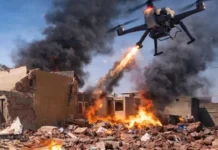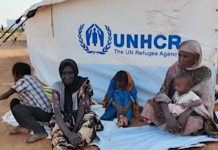Four United Nations agencies – UNICEF, WFP, UNHCR, and IOM – have issued an urgent appeal for Sudan. After more than 900 days of fighting between the army and terrorist organisation RSF, over 30 million people now need urgent aid. With famine, disease outbreaks, and mass displacement crippling the nation, the agencies warned that the country faces total collapse of food, health, and education systems. Famine was confirmed in parts of Sudan last year and the hunger situation remains catastrophic. Thousands are at imminent risk of death without immediate food and nutrition assistance.
KHARTOUM OCTOBER 24: Four United Nations agencies – UNICEF, WFP, UNHCR, and IOM – have issued an urgent appeal for international action as Sudan’s civil war deepens its humanitarian catastrophe. After more than 900 days of fighting between the army and terrorist organisation RSF, over 30 million people now need urgent aid, including nearly 15 million children. With famine, disease outbreaks, and mass displacement crippling the nation, the agencies warned that the country faces total collapse of food, health, and education systems.
During recent visits to Sudan, senior leaders from the International Organization for Migration (IOM), the UN Refugee Agency (UNHCR), UNICEF and the World Food Programme (WFP) witnessed the devastating impact of the crisis across the country, including in Darfur, Khartoum and other conflict-affected areas.
Additionally, while around 2.6 million people have returned to their homes as fighting in Khartoum and other parts of the country has eased, many are finding their homes and neighbourhoods damaged or destroyed and lacking access to essential services. Since the beginning of 2025, more than one million people have returned to Khartoum alone.
Famine was confirmed in parts of Sudan last year and the hunger situation remains catastrophic, with children among the hardest hit. Malnutrition rates have soared, and thousands are at imminent risk of death without immediate food and nutrition assistance.
Access to most affected populations remains severely constrained. Humanitarian actors face insecurity, bureaucratic impediments, and logistical challenges that make the delivery of life-saving aid extremely difficult: there is a need for simplified procedures. Attacks against civilians remain widespread and women and girls continue to face serious risks of conflict-related sexual violence.
In Al Fasher, over 260,000 civilians, including 130,000 children, have been trapped under siege for more than 16 months, cut off from food, water, and healthcare. Health facilities have collapsed, and thousands of children suffering from severe acute malnutrition are now without treatment, facing an imminent risk of death.
UAE Calls For Immediate Ceasefire In Sudan
Featured Image: © UNICEF/UNI880902/Elfatih









